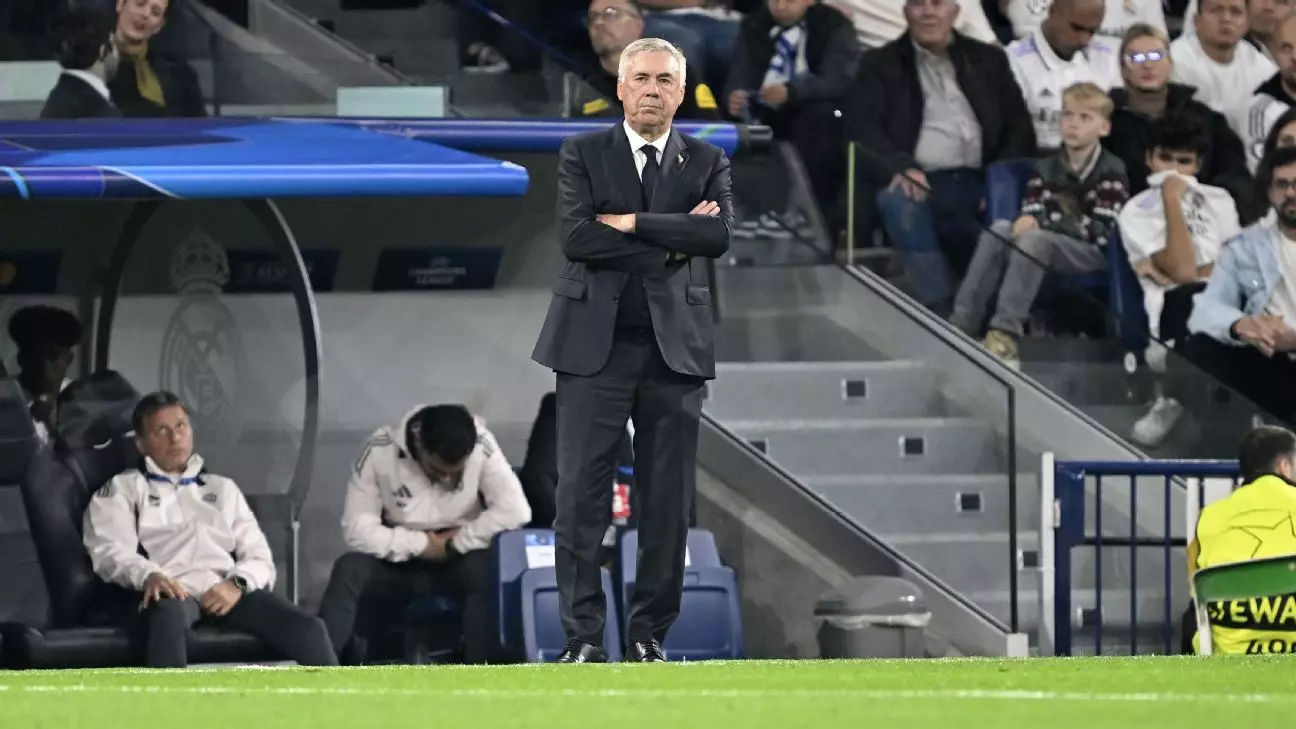Real Madrid, a club steeped in history and decorated with countless accolades, finds itself grappling with an unsettling reality as the current season unfolds. Following a disappointing 3-1 loss to AC Milan in the Champions League, compounded by a staggering 4-0 defeat to their arch-rivals Barcelona in El Clásico, the pressure is mounting. Head coach Carlo Ancelotti has voiced his apprehensions about the squad’s performance, declaring that they “should be worried.” This sentiment encapsulates the broader anxiety surrounding the team’s current form and trajectory.
The match at Santiago Bernabéu illustrated a series of defensive frailties that have plagued Real Madrid throughout their campaign. The opening goal by Malick Thiaw highlighted a lack of defensive cohesion, as the players failed to adequately mark their opponents. Vinícius Júnior’s penalty, which equalized the score, momentarily rekindled hope, but Álvaro Morata restored Milan’s lead before halftime, exposing Madrid’s defensive vulnerabilities. The final nail in the coffin came from Tijani Reijnders, who capitalized on a counter-attack, underscoring the chronic inability of Madrid to manage transitions effectively.
With two losses in four Champions League matches, the situation appears dire. Ancelotti’s assertion that his team needs to be “more solid” and “more compact” speaks volumes about their disjointed performances, as they have conceded nine goals over just three matches. This stark statistic points to an urgent need for defensive restructuring and a recalibration of tactics.
Ancelotti has emphasized that the issues lie not solely with their attacking prowess—despite the star-studded lineup featuring Kylian Mbappé and Vinícius Júnior. The head coach indicated that while the team created numerous chances, their clinical finishing was not as concerning as the ease with which opponents carved out opportunities. It raises critical questions about the players’ understanding of defensive responsibilities and the collective organization on the pitch.
The notion that Madrid is “not lazy” but rather struggling with effective teamwork serves as an indictment of the current system in place. This echoes the sentiment that individual talent, while valuable, cannot supplant a coherent, well-drilled unit capable of executing the coach’s strategies. The absence of this defensive solidarity is alarming for a club whose identity has traditionally revolved around dominance and control.
Ancelotti’s assurance that the dressing room atmosphere remains healthy, despite the team’s struggles, is a crucial element in navigating this turbulent phase. The arrival of Mbappé was seen as a game-changer, yet it begs the question of how the integration of such a high-profile player affects team dynamics. Could it lead to increased pressure and scrutiny? Or does it pit teammates against one another in a bid for supremacy in the lineup?
The coach’s acknowledgment of the inevitable criticism the team will face—stemming from expectations tied to their storied history—exemplifies the harsh realities of elite football. Players and staff alike must confront the external judgments with resilience, but it is critical that they also engage in introspection to identify and rectify the underlying issues at hand.
The road ahead doesn’t get easier as Real Madrid prepares to face Osasuna just days later, followed by a challenging encounter against Liverpool in the Champions League. The upcoming matches present an opportunity for redemption—a chance to regain not just points, but also confidence. Ancelotti must navigate this period with strategic acumen, balancing short-term fixes with long-term development.
While setbacks are an inevitable part of any sport, momentum shifts can be fleeting. For Real Madrid, regaining their form requires not just tactical adjustments but also fostering a collective mentality that upholds their legacy. Ancelotti’s admission of worry is a call to arms; it’s a reminder that success is not guaranteed and must be earned through hard work and unity on the pitch. The challenge for Real Madrid lies in overcoming adversity, returning to their roots of solidity, and drawing upon their rich history to forge a path forward.

